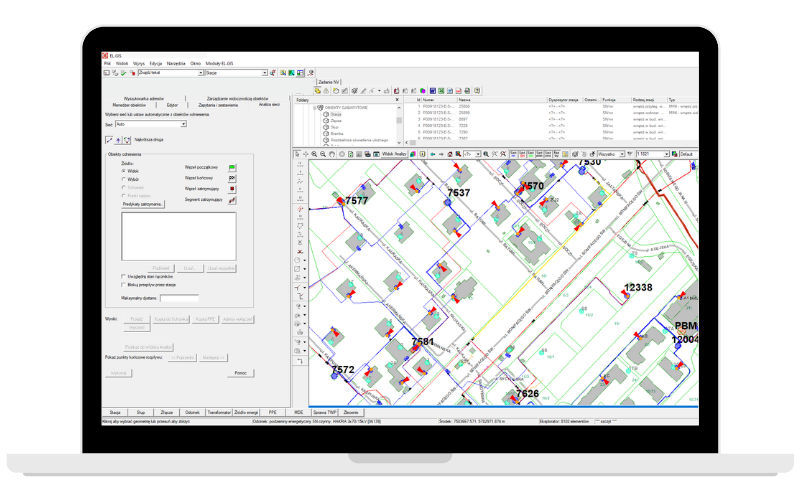The successful implementation of a network inventory system hinges on the efficient acquisition and maintenance of digital data about network facilities.
For digital data sources, converting data into a consistent and sophisticated network inventory model (data conflation) necessitates accessing and analyzing information in various formats. This includes databases, text files, Excel tables, image files (both raster and vector), as well as network data sources such as WMS, WFS, external APIs, and others.
Challenges of converting data to a consistent network model
Providing geospatial context to data
from diverse sources and correctly identifying objects across scattered attributes from multiple data sources is a tedious process.
Constructing a network topology
for data from fragmented sources, without explicit identification of topological relationships, is slow and error-prone.
Analyzing multiple data sources to identify network object types,
consistent with the inventory system’s model, is complex and time-consuming.
The variety in object representations,
differing structures, visualization methods, and map location accuracy in different data sources complicates the process of identifying and unifying the network model.
Solution – FME Platform
Streamlining Data Conversion for Network Inventory Systems

What are the capabilities of the FME Platform?
FME facilitates the streamlined development of scripts for the migration and integration of data from diverse sources, ensuring efficiency in the process.
Easily merge data sources
Effortlessly convert data between more than 450 different formats and applications, including spatial data.


Transform data to meet specific requirements
Easily modify it, verify its quality, and fix errors.
You’ll transform data to meet your requirements
Easily modify it, verify its quality, and fix errors.

Reduce manual, repetitive tasks
Build automations using a simple interface with drag-and-drop functionality.

Benefits of the FME Platform:
Read more about the capabilities of the FME platform and its applications on the solution page.
Automated validation and migration of project documentation into an inventory system
See how Globema’s FME solution assisted Nexera, a telecom company, in automating the process of data validation, error repair, and accelerating data migration to the network inventory system.

FME is part of the GlobIQ platform for building and maintaining a digital model of network assets.
For more information on acquiring and updating network data, visit the GlobIQ solution page.
Why partner with us?

During our digitization projects we helped acquire data about:
1 000 000
network connection points
100 000
kilometers of cables
20 000
devices, such as rack spaces and conduits
3 200
kilometers of pipelines
31 000
kilometers of energy networks (LV, MV, and HV)
12 000
energy stations with internal schemas
8 000 000
devices (poles, connectors, measurement devices, and others)
We’re trusted by:






Would you like to learn more about the GlobIQ Platform?
- Schedule a short call and find out what we can offer. Our experts will analyze your business needs and suggest the right solution and next steps.
- Together, we can complete a pilot project. Try out the solution in practice.
- Sign the agreement and together, let’s complete a project accelerating the digital transformation of processes at your company!
22 848 73 13
sales@globema.pl






